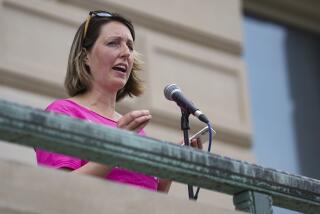Orange County Focus is dedicated on Monday to analysis of community news, a look atwhat’s ahead and the voices of local people. : IN PERSON : Shining the Light of Ancient Virtues on Modern Dilemmas
- Share via
Visiting Greece last month, Corrine Bayley stood before the humbling sight of the Oracle at Delphi and envisioned the ancients who trekked to the sacred site seeking a glimpse of the future. She imagined the ancient Greek society, so advanced in philosophy and science, yet not above abandoning infants with disabilities or buying and selling people like chattels.
Strolling through the ruins, she mused about how far civilization has come, especially in regard to the sanctity and value of human life. Those are familiar themes in both the spiritual and professional lives of the 54-year-old Bayley, a nationally recognized medical ethicist who, until 1988, was also a Catholic nun.
The interlude at the spot the Greeks considered the center of the Earth only set Bayley up for an especially rude shock when she returned home to Orange County. Newspaper headlines during her absence--reporting charges of stolen embryos and unapproved drug use at the UC Irvine Center for Reproductive Health--made her ponder how enlightened modern society really is.
“I realized we have come a long way in some areas, but in other ways not as far as we think,” said Bayley, senior vice president of St. Joseph Health System, a corporation that oversees nine hospitals. “The Greeks questioned the meaning of life and how people should treat one another. They talked about universal virtues and universal truths. Those ancient virtues of truth and respect are what make this such an affront to me.”
A trio of UCI doctors are being investigated for clinical, research and financial improprieties. The core accusation is that human embryos and eggs, in as many as 30 instances, were implanted in women without the consent of donors or recipients. The physicians have been steadfast in their denials of wrongdoing.
“It’s outrageous if they’ve done the things that are alleged, and it wasn’t science that did it, it was their lack of moral sensibilities.” Bayley said. “They were either immoral or they were stupid. And I don’t think they’re stupid.”
*
For Bayley, a tall, straight-backed woman with crystal blue eyes and a quick smile, the alleged doings at the prestigious clinic are an extreme example of the type of medical excesses she has been working against for a decade.
In 1984, she helped launch California Health Decisions, a nonprofit group that tries to build bridges between the public and health care providers. Several million people have participated in the group’s surveys and activities. The goal, Bayley said, is to highlight citizen values, chief among them: affordability, availability and quality.
Bayley also has helped dozens of hospitals draft ethical codes to guide their employees through the thicket of moral issues that grow in the wake of whirlwind technological advances. In the early 1980s, she even sat on the UCI committee that put to paper that institution’s ethical parameters.
“You know, when you talk about medical ethics, sometimes people laugh and say, ‘Oh yeah, are there any ethics in medicine?’ ” Bayley said. “That sort of suggests to me that people already are a little bit wary about the doctor-patient relationship. . . . Maybe we’re jaded, but I think as a society we’ve become accustomed to political scandals, or corruption among people with power and money, but these medical instances leave the public, I think, feeling especially betrayed.”
Bayley, born in Santa Ana, never anticipated grappling with such issues when she graduated with an English degree from St. Joseph College in Orange in 1964. The young nun was unsure what her service to the St. Joseph’s order would be until a year later when, at age 24, she was told she would pursue a master’s degree that would lead to a career as a hospital administrator.
She toiled in that capacity for nine years until a summer bioethics course suggested “a fascinating new direction.” A decade later, after getting a master’s degree in medical ethics and religion at the Pacific School for Religion in Berkeley, she helped found the Center for Healthcare Ethics at St. Joseph Health System.
In 1988, after 29 years as a nun, Bayley calmly told her superiors that she would be leaving the order, the only life she had known since age 18. Last week, Bayley paused before describing her resignation. She looked out her window, toward a courtyard separating her book-lined office from a bronze statue of the order’s California founders.
“I realized that my spiritual journey had changed,” she said. “I wasn’t really growing personally or spiritually in the way that I felt I could. It was a difficult choice . . . people often compare it with ending a marriage, but it didn’t feel like a rupture or a dissolution for me.”
Still, in some ways it felt as if she had turned away from her extended family, she conceded. Any awkwardness she may have felt has passed, and Bayley says she looks back on her life in and out of the order with “not a single regret.”
Learning independent living skills at age 47 wasn’t easy. Bayley had to contend with mundane challenges, such as dealing with a checkbook, taxes and a lease. The new freedoms, such as a place of her own and a car, invigorated her. Some things, she said, have not changed. “I still have a calling, it’s just a different sort.”
The future, she says, promises more ethical dilemmas. The public should expect more controversies, especially with the explosion in genetic technology. More safeguards are necessary, she said, as are some hard questions worthy of any ancient oracle.
“When significant developments in technology outstrip our ability to think about the best way to use them, you have conflicts and gray areas,” she said “Should we do everything we can do? That’s a key question.”
More to Read
Sign up for Essential California
The most important California stories and recommendations in your inbox every morning.
You may occasionally receive promotional content from the Los Angeles Times.










